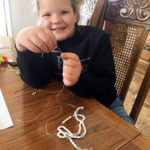
Disunity in the Catholic Church, locally and universally, is a huge issue to Bishop Thomas Zinkula. So much so, that he focused his Good Friday homily on the causes of disunity.
He was not the only prelate to do so. Cardinal Raniero Cantalamessa, the preacher of the papal household, addressed the “bitter divisions among Catholics.” Both prelates call on us to examine our conscience, to pray for a conversion of hearts — ours first — and to recommit ourselves to being a unified church.
We must confront the evil in our midst dividing us from one another, tearing apart our community, Bishop Zinkula says. We must recognize and avoid the evil that works to draw us together in a negative way — through mob hysteria, social media hype, racism, sexism, envy and hatred. From the time of Jesus’ passion and death to the present day, “this evil leads to lynching, violent protests and crucifixions. It was satanic forces that caused Jesus’ crucifixion.”
“The most common cause of the bitter divisions among Catholics … is not dogma, nor is it the sacraments and ministries,” Cardinal Cantalamessa said. “The divisions that polarize Catholics stem from political options that grow into ideologies taking priority over religious and ecclesial considerations and leading to complete abandonment of the value and the duty of obedience in the church.”
Cardinal Cantalamessa calls this division “sin in its primal meaning.” He sees a need for “a serious examination of conscience” and conversion when support for political candidates, parties or policies receive priority over the building up of the kingdom of God and the unity of his body, the church. Catholic bishops and priests need to be the first to make a serious examination of conscience, he said (See story on Page 1 of the print/e-edition).
Bishop Zinkula asks us “to open our eyes and look honestly into our own hearts and at the world today — from politics to social media to even our religious institutions.” The powers of the Devil and Satan can take hold anywhere.
Let us stop sowing division and attributing false motives to others, calling for persons on the other side of the spectrum to be cancelled. These sins of commission result in the breakdown of community and civility, stalemate in our politics, loss of trust in leaders and institutions, and the fading of truth. Recall that Pilate asked, “What is truth?”
We do not foster unity by separating ourselves from others and planting ourselves firmly and exclusively in groups of people who think alike and have the same self-interests. “We need to name the evil in our midst as we see the ever-intensifying and bitter polarization inside our families, parishes, neighborhoods, cities, counties and church,” Bishop Zinkula says.
We foster unity by committing to respectful interactions. Cardinal Cantalamessa spoke of the “Second Vatican Council entrusting laypeople with the task of translating the social, economic and political implications of the Gospel into practice in different historical situations, always respectful, in a peaceful way (CRUX, 4-2-21).”
We foster unity by reflecting on Scripture, recalling what Jesus asks us to do. “Shortly before he was arrested, Jesus prayed to his Father: ‘I pray … that they may all be one, as you, Father, are in me and I in you, that they also may be in us.’” This should be “our prayer, our thoughts, our words and our actions,” Bishop Zinkula said.
In a homily he gave for the Easter Vigil, the bishop told his listeners how “God can squeeze grace out of difficult situations. God can turn them on their head. If, that is, we invite God into our troubles so he can transform them.”
“God squeezed grace out of Jesus’ passion and death … raised him to new life!” the bishop said. “The Easter message is a message that is both old and new. Love is stronger than hate. Good is stronger than evil. Hope is stronger than despair. Life is stronger than death … and nothing is impossible with God.”
Barb Arland-Fye, Editor
arland-fye@davenportdiocese.org











